Why Do People Find the Holocaust Funny
A line from an episode of the popular sitcom "Broad City" bears witness to the transformation of Holocaust humor since the turn of the millennium: "We cannot be losing Holocaust survivors, not now that the world is gaining Nazis somehow!"
A generation after the solemnity of "Schindler's List" and creation of the United States Holocaust Memorial Museum, Jewish humor touching on the genocide is ubiquitous in pop culture.
A new book called "Laughter After: Humor and the Holocaust" traces Holocaust humor since "Life is Beautiful." In that controversial 1997 film, actor Roberto Benigni helped his son survive life in a concentration camp through play-acting.
But Benigni didn't invent the genre, and neither did Mel Brooks, who spoofed Adolf Hitler in the 1960s: From gallows humor on the stages of Westerbork and Theresienstadt, to lists of jokes buried underneath the Warsaw Ghetto in the "Oneg Shabbat" archive, there are diverse primary sources for Jews using humor as a coping mechanism during the Holocaust.
"Whether revelations about humor during the war (including jokes, satirical songs and plays, and films) or satirical plays in Displaced Persons camps that mocked the Jews' vanquished enemies, humorous treatment of issues surrounding the Holocaust date back to the war itself," wrote the editors in their introduction to "Laughter After."
"We wanted to look at the seeming proliferation of Holocaust-themed humor around the world over the last 25 years and try to understand the reasons for this growing phenomenon in a historical, cultural, sociological, and comparative sense," said co-editor Avinoam Patt in an interview with The Times of Israel.
Patt said that after the film "Life is Beautiful," "many comedians sought to challenge what they saw as enforced solemnity and the hypocrisy of judging some forms of Hollywood representation as sacred while marking others as inappropriate."
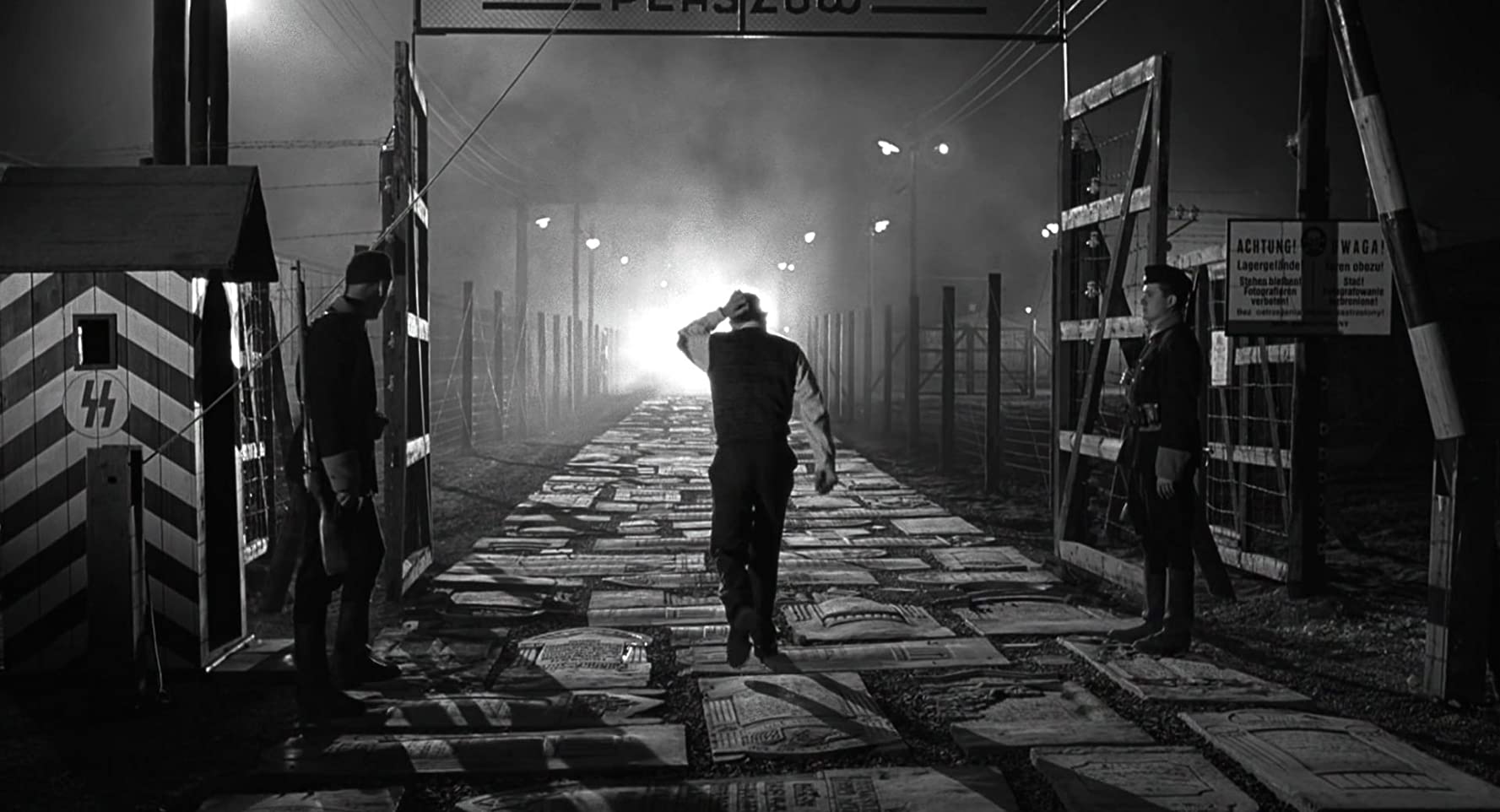
In the 1993 film 'Schindler's List,' the character played by Ben Kingsley pretends he has lice to avoid Germans coming close to him (Universal Pictures)
Co-edited by David Slucki and Gabriel N. Finder, the book is an expansive take on the functions and ethics of Holocaust humor.
"This is not just about the boundaries of Holocaust humor and more broadly memory of the Holocaust, but is also a study of humor itself," said Patt. "We have essays that deal with many important cultural forms of expression: literature, film, television, music, song, stand-up philosophy, and more."
According to Patt, humor can play a "memorial function," helping us probe topics that are psychologically difficult.
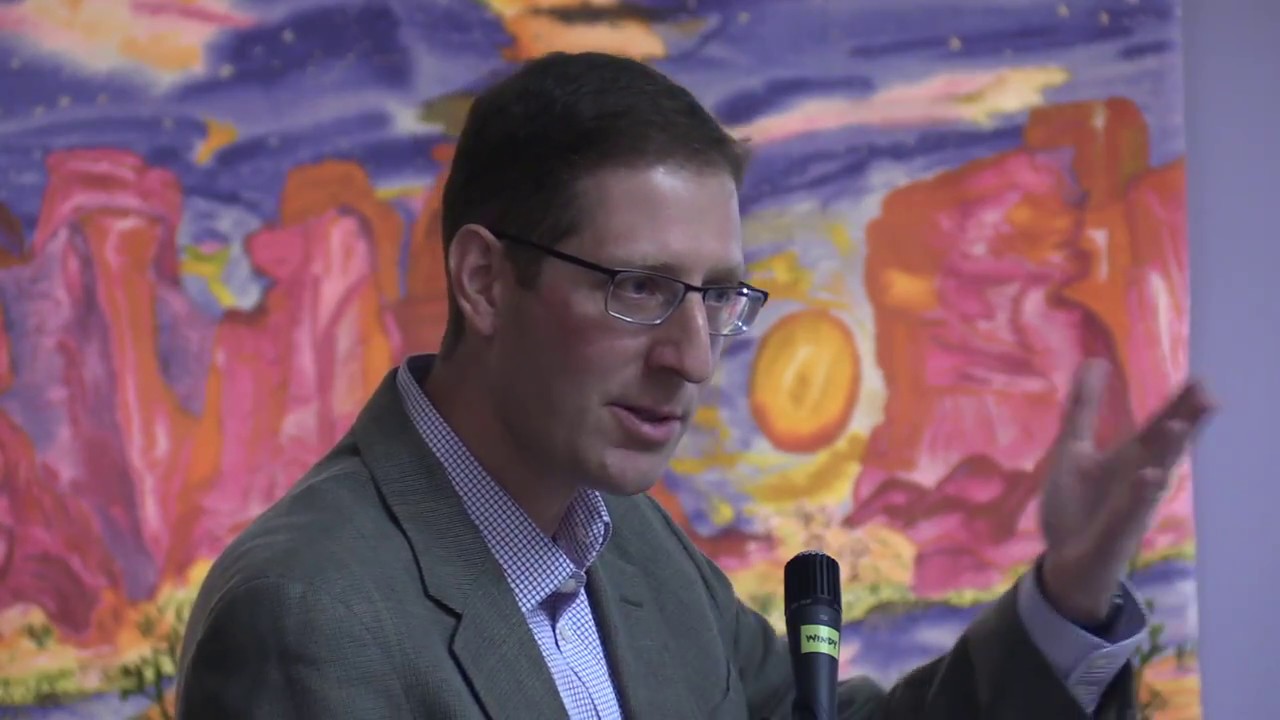
Professor Avinoam Patt, co-editor of 'Laughter After: Humor and the Holocaust'
"[Humor] also opens up a space for comedians to explore what they see as the hypocrisy of new conventions like Holocaust tourism, forced artificial sadness in memorial spaces, and real concerns over the politicization of Holocaust memory," said Patt.
One of the book's essayists, Jarrod Tanny, takes things a step further. In his assessment, the human psyche requires humor to grasp the scope of genocide.
Holocaust humor destabilizes the standard narrative we receive through historiography, documentaries, and monuments
"Holocaust humor destabilizes the standard narrative we receive through historiography, documentaries, and monuments," wrote Tanny. "It is an alternative lens through which we can understand one of the greatest catastrophes of the twentieth century. Humor forces us to think seriously about genocide."
When asked if he agreed with Tanny's sentiment, Patt said yes and no.
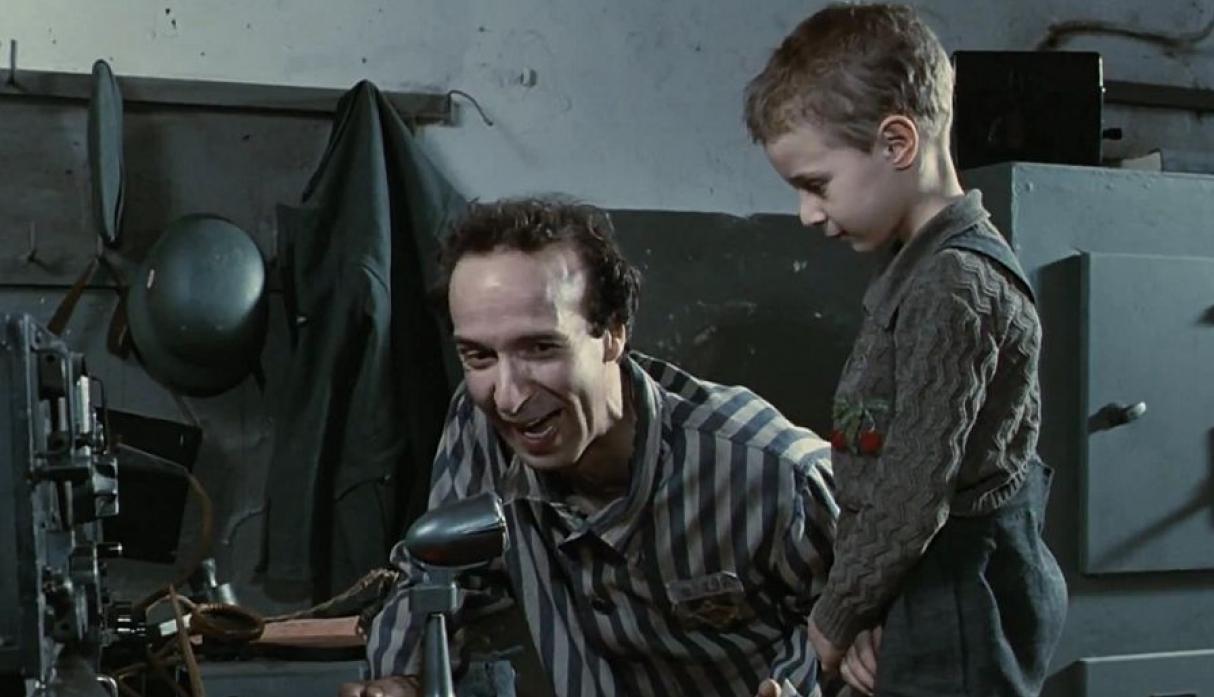
The film 'Life is Beautiful' (1997)
"I am not sure humor will always get people to think seriously about genocide," said Patt. "Sometimes it will have the opposite effect. But, it is a subject worthy of serious academic study."
'I think about her eyebrows'
If you want to hear a multitude of jokes about Anne Frank, follow Israelis on Twitter.
To write her essay on Anne Frank humor, Liat Steir-Livny did just that, documenting how the martyred diarist appeared in Israelis' Twitter feeds for one and a half years.
Although jokes about Anne Frank are ubiquitous around the world, they serve a special function in Israel, wrote Steir-Livny. While most Anne Frank jokes seek to "deconstruct" the diarist's iconic status, the jokes told about her in Israel are part of reshaping a conversation.
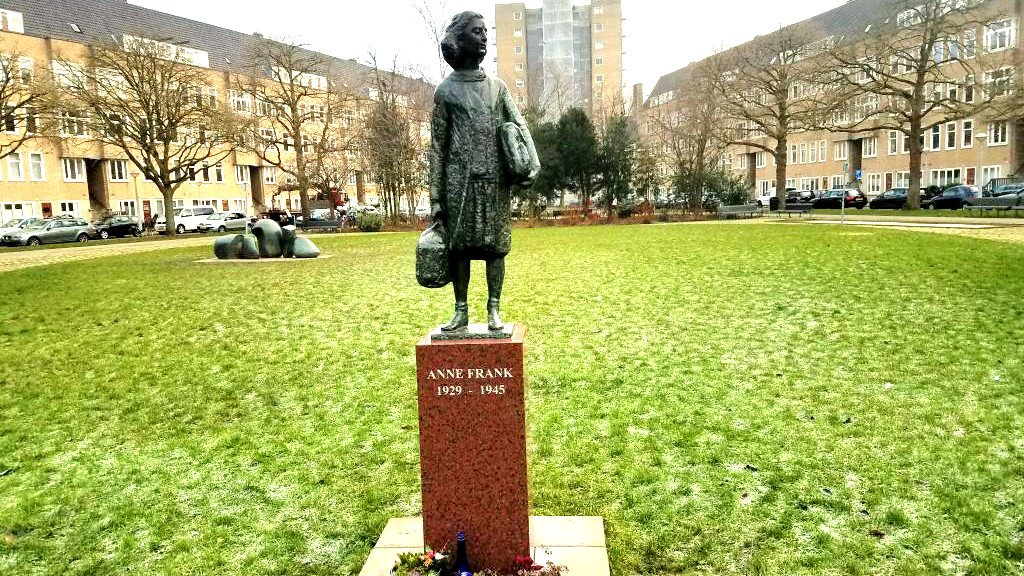
Erected in 2005, a statue of Anne Frank stands close to the Frank family's former apartment in Amsterdam's River Quarter, January 2017 (Matt Lebovic/The Times of Israel)
In Israel, Holocaust humor "reflects humor's important role as a defense mechanism against the acting-out of the trauma, a tool to vent frustration and fight various aspects of Holocaust commemoration, and an attempt to tone down the constant anxiety that the canonical memory agents create by deconstructing the fear factor," wrote Steir-Livny.
For her essay about the "comical figure" Anne Frank has become in Israel, Steir-Livny compiled the Anne Frank Twitter jokes by topic. On social media, the diarist was invoked by people living on Israel's periphery, desperate mothers, home decorators, and many others.
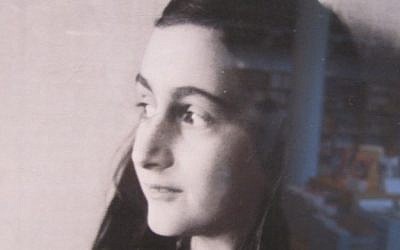
Photograph taken in the Anne Frank House book shop with her image and translated copies of the diary in the background. (Matt Lebovic/The Times of Israel)
One of two jokes labelled "self-referential about looks:"
"I won't be caught not ready! And when I say 'won't be caught' I think about Anne Frank and when I say 'not ready' I think about her eyebrows."
Then there is:
"I'm pretty sure that 'Anne Frank' was not my response when I was asked what kind of hairdo I want," said by a disappointed woman leaving a salon after a bad haircut."
According to Steir-Livny, the use of Anne Frank humor on Twitter "reveals how deeply the Holocaust is an integral part of the identity of members of the younger generation, who often use Anne Frank references to talk humorously about their everyday life," she wrote.
All in the family

Illustrative: Two Holocaust survivors receiving a food delivery from Adopt a Safta volunteers. (Courtesy: Adopt a Safta)
In her essay on jokes told by the grandchildren of Holocaust survivors, Jordana Silverstein wrote about the "excess of memory" afflicting some of those grandchildren. For individuals overwhelmed by their family's Holocaust past, there is more to those jokes than punchlines.
"These moments of humor come out of what Jonathan Boyarin, in a different context, calls 'a palpable desire for communion with the dead,'" wrote Silverstein.
"But they are also a yearning for communion with the present and with the legacies that the ghosts, hauntings, and traumas of the Holocaust bring into the real life of the present," she wrote.
'The conscience of the people'
Knowledge of the Holocaust is at an all-time low, we are told. Many young adults cannot tell you what Auschwitz was or how many victims were killed.
In Patt's assessment, this is not a generational issue. Even among adult Jews, he said, Holocaust knowledge is not as deep as imagined.
Often humor points out the very real superficial knowledge about the Holocaust
"I do not know how deep knowledge of Holocaust history among the general public has ever really been," said Patt.
"The average Jewish audience deals more in symbols and icons of Holocaust memory that are very often invoked in a humorous sense — through Anne Frank jokes, Hitler jokes, and the like," said Patt. "Very often that humor points out the very real superficial knowledge about the Holocaust."
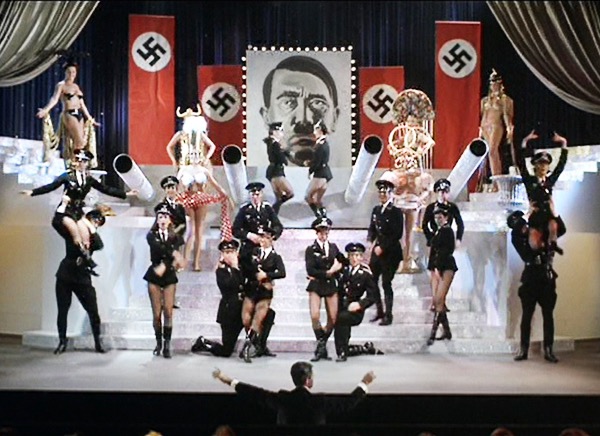
The film 'The Producers' (1967)
When asked if he worried that Holocaust humor was replacing Generation Z's engagement with the facts, Patt's co-editor, Gabriel N. Finder, said not so much.
"College and university enrollments in courses on the Holocaust are relatively high," said Finder. "My co-editors and I all teach the Holocaust at our respective universities, and our classes are full. This is an indication that interest in the Holocaust among many members of Generation Z is at a high level."
The last essay in "Laughter After" is about "The Last Laugh," a documentary on humor and the Holocaust. In the 2016 film, Mel Brooks said his life's mission is to make people laugh at Hitler. With humor, the director has forced people to process the darkest period of Jewish history.
"Comics are the conscience of the people, and they are allowed a wide berth of activity in every direction," said Brooks. "Comics have to tell us who we are, where we are, even if it's in bad taste."
This article contains affiliate links. If you use these links to buy something, The Times of Israel may earn a commission at no additional cost to you.
Source: https://www.timesofisrael.com/holocaust-humor-upends-mainstream-history-scholars-explain-why-thats-important/
0 Response to "Why Do People Find the Holocaust Funny"
Post a Comment